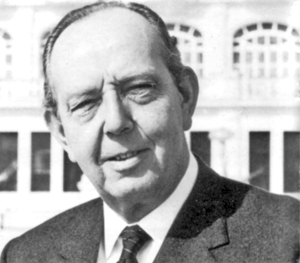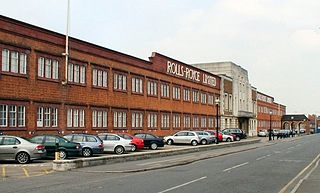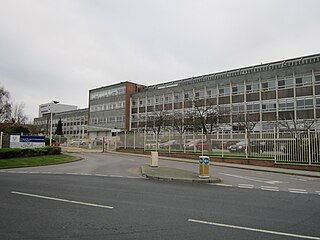Related Research Articles

The Rolls-Royce Olympus was the world's second two-spool axial-flow turbojet aircraft engine design, first run in May 1950 and preceded only by the Pratt & Whitney J57, first-run in January 1950. It is best known as the powerplant of the Avro Vulcan and later models in the Concorde SST.

Sir Stanley George Hooker, CBE, FRS, DPhil, BSc, FRAeS, MIMechE, FAAAS, was a mathematician and jet engine engineer. He was employed first at Rolls-Royce where he worked on the earliest designs such as the Welland and Derwent, and later at Bristol Aero Engines where he helped bring the troubled Proteus turboprop and the Olympus turbojet to market. He then designed the famous Pegasus vectored thrust turbofan used in the Hawker Siddeley Harrier.
The West Bridgford School is a co-educational comprehensive school with academy status in West Bridgford, Nottinghamshire, England.
Bristol is a city in south west England. Its economy has long connections with the sea and its ports. In the 20th century aeronautics played an important role in the economy, and the city still plays a role in the manufacture of aircraft. Bristol is also a tourist destination, and has significant media, information technology and financial services sectors. Reports released in 2018 showed that the city is growing exponentially with a projected 2.3 percent annual growth rate until 2020.

Rolls-Royce Limited was a British luxury car and later an aero-engine manufacturing business established in 1904 in Manchester by the partnership of Charles Rolls and Henry Royce. Building on Royce's good reputation established with his cranes, they quickly developed a reputation for superior engineering by manufacturing the "best car in the world". The business was incorporated as "Rolls-Royce Limited" in 1906, and a new factory in Derby was opened in 1908. The First World War brought the company into manufacturing aero-engines. Joint development of jet engines began in 1940, and they entered production in 1944. Rolls-Royce has since built an enduring reputation for the development and manufacturing of engines for military and commercial aircraft.

ThePriory City of Lincoln Academy is a co-educational secondary academy and sixth form in Lincoln, Lincolnshire, England. It is a member of The Priory Federation of Academies and leads the government's School Games Organiser programme. It is also a specialist school in sports and health, exercising a partially selective intake in the former.
Top of the Form was a BBC radio and television quiz show for teams from secondary schools in the United Kingdom which ran for 38 years, from 1948 to 1986.

The aerospace industry of the United Kingdom is the second-largest national aerospace industry in the world and the largest in Europe by turnover, with a global market share of 17% in 2019. In 2020, the industry employed 116,000 people.

The Rolls-Royce/Snecma Olympus 593 was an Anglo-French turbojet with reheat, which powered the supersonic airliner Concorde. It was initially a joint project between Bristol Siddeley Engines Limited (BSEL) and Snecma, derived from the Bristol Siddeley Olympus 22R engine. Rolls-Royce Limited acquired BSEL in 1966 during development of the engine, making BSEL the Bristol Engine Division of Rolls-Royce.
Alfred Cyril Lovesey CBE, AFRAeS, was an English engineer who was a key figure in the development of the Rolls-Royce Merlin aero engine.

David Warren Arthur East is a British businessman and engineer. He is a former chief executive officer (CEO) of Rolls-Royce Holdings, a leading UK-based engine manufacturer, and previously held senior positions at ARM Holdings and Texas Instruments.
Go With Noakes was a BBC Television children's programme, broadcast between 28 March 1976 and 21 December 1980.

The Unilever Research & Development Port Sunlight Laboratory is the multinational consumer goods company Unilever's main research and development facility in the United Kingdom. It is located in Bebington, Merseyside.
Peter Henry Calder OBE FREng was a British mechanical engineer; he was head of the development of the engine programme for Concorde.
The teaching of modern languages in the United Kingdom occurs mainly from ages 7 to 16 in primary schools and secondary schools.
The history of air traffic control in the United Kingdom began in the late 1950s, and early 1960s, when an integrated and coordinated system began, once radar had become sufficiently advanced to allow this.
The Shell Technology Centre was a chemical and oil products research institute in northern Cheshire, near Stanlow, owned by Anglo-Dutch Shell.
Soviet industrial espionage of the Concorde programme is alleged to have been carried out from 1959 to 1976. Not all allegations have been verified, but documents from Sud Aviation and BAC development did reach Soviet hands.
The Career Development Institute is the British professional association for career development.
Paul Anthony Hickson was a serial rapist and a British former swimming coach, originally from Leicestershire. He coached the British Olympic swimming team at two Olympics in the 1980s, but behind his sporting prowess, he had been a determined and devious serial rapist of teenage female swimmers, who had misplaced their trust in him.
References
- ↑ Times obituary Wednesday August 7, 1985, page 12
- ↑ Bristol Evening Post Wednesday 20 December 1967, page 2
- ↑ Western Daily Press Friday 3 January 1969, page 4
- ↑ The Change Makers January 1969
- ↑ Bristol Evening Post Monday 3 March 1969, page 16
- ↑ Bristol Evening Post Thursday 4 May 1972, page 13
- ↑ Nottingham Evening Post Thursday 27 February 1975, page 8
- ↑ Faster than the Sun 1983
- ↑ BFI 1983
- ↑ Western Daily Press 3 March 1969, page 27
- ↑ Bristol Evening Post Monday 3 March 1969, page 42
- ↑ Bristol Evening Post Friday 21 February 1986, page 14